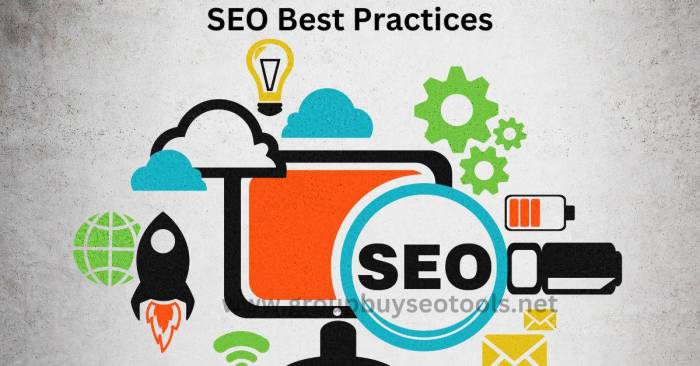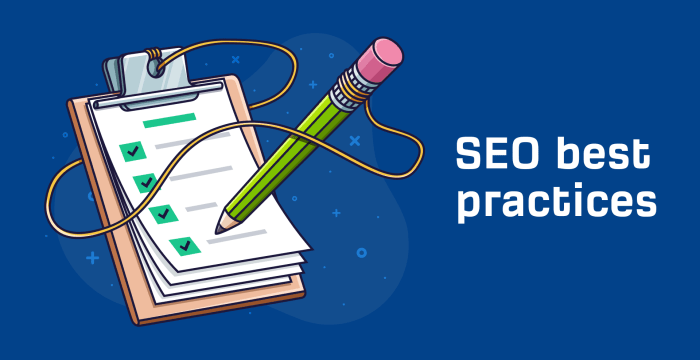SEO Best Practices – Best Practices kickstart your website’s journey to the top of search engine rankings, paving the way for increased visibility and organic traffic. Get ready for a wild ride through the world of with twists and turns you won’t see coming!
From optimizing meta tags to mastering backlinks, we’ve got all the insider tips and tricks you need to dominate the game.
Importance of Best Practices
best practices are crucial for website visibility in the crowded online landscape. By following these practices, websites can improve their search engine rankings, attract more organic traffic, and ultimately increase their online presence.
Improved Search Engine Rankings
Proper techniques can significantly impact a website’s search engine rankings. For example:
- Optimizing meta tags, headers, and content with relevant s can help search engines better understand the website’s content, leading to higher rankings for those s.
- Creating high-quality, valuable content can attract more backlinks from authoritative websites, signaling to search engines that the website is a trustworthy source of information.
- Improving website speed, mobile-friendliness, and user experience can positively impact rankings, as search engines prioritize websites that offer a seamless browsing experience.
Organic Traffic Growth
Following best practices can also lead to significant organic traffic growth. Here’s how:
- By ranking higher in search engine results pages (SERPs), websites are more likely to attract clicks from users searching for relevant information.
- Optimizing for long-tail s and local search can help websites target specific audiences and drive targeted organic traffic to the site.
- Regularly updating and optimizing content can help websites maintain and improve their search engine rankings over time, leading to sustained organic traffic growth.
On-Page Best Practices: SEO Best Practices

When it comes to optimizing your website for search engines, on-page plays a crucial role in improving your rankings. By focusing on elements such as meta tags, headings, URLs, internal linking, and content quality, you can enhance your website’s visibility and attract more organic traffic.
Optimizing Meta Tags, Headings, and URLs
Meta tags, including title tags and meta descriptions, are essential for telling search engines what your page is about. Make sure to include relevant s in these tags to improve your website’s visibility in search results. Headings (H1, H2, H3, etc.) should be used to structure your content and make it easier for both users and search engines to understand the hierarchy of information. Additionally, creating -friendly URLs that include s related to your content can also boost your on-page efforts.
The Importance of Internal Linking, SEO Best Practices
Internal linking is crucial for on-page as it helps search engines discover and index other pages on your website. By linking relevant pages together, you can establish a hierarchy of information and guide users to more valuable content. This not only improves the user experience but also helps search engines understand the context and relevance of your content.
High-Quality, Relevant Content is Key
One of the most important aspects of on-page is creating high-quality, relevant content that provides value to your audience. Search engines prioritize websites that offer informative and engaging content, so make sure to focus on creating content that is unique, well-researched, and tailored to your target audience. By consistently publishing high-quality content, you can establish your website as a trusted source of information and improve your search engine rankings.
Off-Page Best Practices

When it comes to Off-Page , it’s all about establishing your website’s authority and credibility on the internet beyond just optimizing your own pages. This involves strategies that take place outside of your website to improve its search engine rankings.
Role of Backlinks in Off-Page Strategies
Backlinks play a crucial role in off-page . These are links from other websites that direct users back to your site. Search engines like Google view backlinks as a vote of confidence in your content, indicating that others find your website valuable and trustworthy. The quality and quantity of backlinks to your site can significantly impact your search rankings.
- Quality backlinks from reputable websites carry more weight than a large number of low-quality backlinks.
- Building a diverse backlink profile from a variety of sources can help improve your site’s authority.
- Natural backlinks earned through high-quality content are more valuable than paid or spammy backlinks.
Importance of Social Media Presence for Off-Page Optimization
Having a strong presence on social media platforms is essential for off-page . Social signals, such as likes, shares, and comments on your content, can indirectly impact your search rankings. Engaging with your audience on social media can help drive traffic to your website and increase brand awareness.
- Regularly sharing your content on social media can increase the likelihood of it being shared by others, leading to more backlinks.
- Interacting with your followers and participating in conversations can help build relationships and establish your credibility in your industry.
- Social media profiles often rank high in search engine results, so optimizing your profiles with relevant s can improve your online visibility.
Online Reputation Management Contribution to Off-Page
Online reputation management is another important aspect of off-page . Monitoring and managing your brand’s reputation online can help protect your website’s credibility and authority. Positive reviews and mentions of your brand can enhance your online reputation and attract more visitors to your site.
- Responding to reviews and addressing customer feedback can demonstrate your commitment to customer satisfaction.
- Monitoring mentions of your brand on social media and other websites can help you identify and address any negative comments or misinformation.
- Building a positive online reputation can lead to more organic backlinks and improve your site’s overall performance.
Technical Best Practices
In the world of search engine optimization, technical aspects play a crucial role in determining a website’s ranking on search engine results pages. Let’s dive into some key technical best practices that can help boost your website’s visibility and performance.
Site Speed
Maintaining a fast-loading website is essential for a positive user experience and improved search engine rankings. Slow-loading websites can lead to higher bounce rates and lower conversions. Make sure to optimize images, minify CSS and JavaScript files, enable browser caching, and utilize a content delivery network (CDN) to enhance your site’s speed.
Mobile-Friendliness
With the majority of internet users accessing websites via mobile devices, it’s crucial to ensure that your website is mobile-friendly. Responsive design, mobile-friendly content, and fast-loading mobile pages are all essential factors to consider for improving user experience and search engine rankings.
SSL Certificates
Securing your website with an SSL certificate not only encrypts data transmitted between the user’s browser and the server but also boosts your website’s credibility and trustworthiness. Search engines like Google prioritize websites with SSL certificates, so make sure to secure your website with HTTPS.
XML Sitemaps and robots.txt
XML sitemaps help search engines crawl and index your website’s pages more efficiently, ensuring that all relevant pages are discovered and ranked. On the other hand, robots.txt file helps guide search engine bots on which pages to crawl and which to avoid, enhancing your website’s crawlability and visibility.
Structured Data Markup
Implementing structured data markup using schema.org vocabulary can provide search engines with additional context about your website’s content, helping them display rich snippets in search results. This can enhance your website’s visibility and click-through rates, leading to improved organic traffic and conversions.